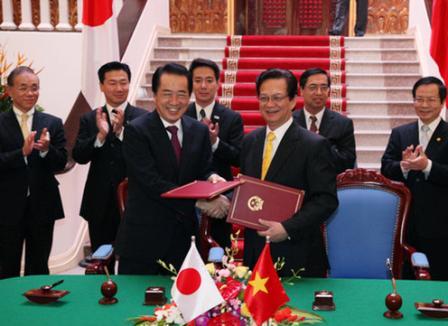Japan boosts cooperation with Vietnam
02 November 2010
Vietnam has selected Japan as a partner for cooperation in the construction of nuclear power plants, the Vietnamese prime minister has told his Japanese counterpart. The announcement came as Vietnam agreed that Russia will build its first plant.
Vietnamese prime minister Nguyen Tan Dung and Japanese prime minister Naoto Kan met in Hanoi on 31 October. Among several accords signed during the meeting was an agreement that Japan would be the cooperative partner in a Vietnamese project to construct a second nuclear power plant in the southern Ninh Thuan province.
 |
| Kan and Dung shake on their agreements (Image: www.kantei.go.jp) |
On the same day, an agreement was signed between Vietnam and Russia for the construction of Vietnam’s first nuclear power plant, at Phuoc Dinh, in Ninh Thuan province. Construction of the first two units of the Ninh Thuan 1plant is scheduled to start in 2014, with the first reactor scheduled to be commissioned by 2020 and the second in 2021.
In May 2008, Japan and Vietnam signed a nuclear energy cooperation agreement, under which Japan would help Vietnam prepare and plan for the introduction of nuclear energy, educate experts in nuclear power and help the country formulate nuclear safety regulations.
In a joint statement, the prime ministers said: "The Vietnamese side has highly appreciated Japan’s continued assistance to Vietnam in the field of the peaceful uses of nuclear energy."
The statement added, "The Vietnamese side affirmed that, on the basis of examining the proposal from the Japanese side, the Vietnamese government had decided to choose Japan as the cooperation partner for building two reactors at the second NPP site in Ninh Thuan province."
Prime minister Naoto Kan welcomed the decision, and assured that Japan would "meet the conditions that Vietnam had set out, such as assistance in conducting feasibility studies for the project, low-interest and preferential loans for the project, the use of the most advanced technology with the highest safety standards, technology transfer and training of human resources, and cooperation in the waste treatment and stable supply of materials for the whole life of the project."
"The sides concurred to assign the relevant agencies and entities of the two countries with the task of continuing together for the early signing of relevant documents on the above-mentioned project," the statement added.
Takuya Hattori, president of the Japan Atomic Industrial Forum (JAIF), commented: "The agreement between the Japanese and Vietnamese prime ministers is both gratifying and very significant for Japan’s nuclear industry, as it will contribute greatly to helping developing countries introduce nuclear power – sure to be a key energy source – in a manner that ensures both safety and non-proliferation, as well as igniting economic growth."
By 2030, Vietnam wants to construct a further 12 power reactors. Two further units are planned at Phuoc Dinh, with operation scheduled for 2023 and 2024, respectively. Four reactors are also planned for Vinh Hai in the Ninh Hai district. The first two are slated to begin operating in 2021 and 2022, with the second pair starting up in 2024 and 2025. A further two units are planned at Vinh Hai in the north-central Ha Tinh province, and then a further six units are envisaged by 2030.
Researched and written
by World Nuclear News